|
Venetian Snares, "Rossz Csillag Alatt Szuletett"
Planet Mu
 From the ominous chords of 40-second opener "Sikertelenseg," a solo piece for untreated piano, it is clear that this is a very different Venetian Snares record than any of the previous 11 albums Aaron Funk has recorded. The titles appear, at first, to be some sort of prankster gibberish, a la Aphex Twin or Autechre. Upon further inspection it is revealed that these are in fact Hungarian titles, as this album was inspired by a trip to Hungary, during which Funk had some sort of epiphany involving imagining himself as a pigeon. As absurd as that sounds, it has fueled the most cohesive effort by Funk to date, on which Eastern European melodies dominate and his trademark blastbeats are used to accent orchestral composition. "Hiszekeny" is a beautiful miniature, which features bells and harp rhythmically dancing around melodic string patterns. "Felbomlasztott Mentokocsi" features no percussion at all, and instead features weeping cellos and violins whose sweeping tones play against each other to echo the tension in life through rhythmic and melodic tension. Funk's take on Rezso Seress's Hungarian suicide song "Ongyilkos Vasarnap" ("Gloomy Sunday") manifests this sense of sadness and loss in a more direct way, by combining stuttering beats with Billie Holiday's vocals from the 1941 recording of the notorious song. Jazzy drumming and downright pastoral wind instrumentation figure prominently in the first half of "Hajnal," before strings combine with hectic breakbeats. As chaotic as the rhythmic programming often becomes, these tracks are always grounded by the melodic elements. This is most effective on "Szamar Madar," during which a gorgeous melodic theme recurs throughout the track's six minute duration. Much of Funk's music is centered around beats in odd time signatures played at break neck speed, keeping listeners on their toes. These pieces, although rhythmically challenging at times, aspire to achieve a higher sense of compositional cohesiveness. Funk is communicating in a language that will appeal to more than just those who are breakcore enthusiasts. Although he has not abandoned the use of intricate rhythms, he allows these tracks more breathing room. Most pieces have long beatless passages during which all manner of acoustic instruments create a tension that makes the rhythmic bombasts more effective when they appear. This is not to suggest that he has simply distilled his usual fare to reach a wider audience. Instead, he has finally shown that he is capable of, or interested in, combining his skills as one of today's most advanced beat programmers with unprecedented foreign elements. In the process he has broken out of the holding pattern his prolific career was beginning to settle into and produced an accomplished work of incredible depth. - Jim Siegel
From the ominous chords of 40-second opener "Sikertelenseg," a solo piece for untreated piano, it is clear that this is a very different Venetian Snares record than any of the previous 11 albums Aaron Funk has recorded. The titles appear, at first, to be some sort of prankster gibberish, a la Aphex Twin or Autechre. Upon further inspection it is revealed that these are in fact Hungarian titles, as this album was inspired by a trip to Hungary, during which Funk had some sort of epiphany involving imagining himself as a pigeon. As absurd as that sounds, it has fueled the most cohesive effort by Funk to date, on which Eastern European melodies dominate and his trademark blastbeats are used to accent orchestral composition. "Hiszekeny" is a beautiful miniature, which features bells and harp rhythmically dancing around melodic string patterns. "Felbomlasztott Mentokocsi" features no percussion at all, and instead features weeping cellos and violins whose sweeping tones play against each other to echo the tension in life through rhythmic and melodic tension. Funk's take on Rezso Seress's Hungarian suicide song "Ongyilkos Vasarnap" ("Gloomy Sunday") manifests this sense of sadness and loss in a more direct way, by combining stuttering beats with Billie Holiday's vocals from the 1941 recording of the notorious song. Jazzy drumming and downright pastoral wind instrumentation figure prominently in the first half of "Hajnal," before strings combine with hectic breakbeats. As chaotic as the rhythmic programming often becomes, these tracks are always grounded by the melodic elements. This is most effective on "Szamar Madar," during which a gorgeous melodic theme recurs throughout the track's six minute duration. Much of Funk's music is centered around beats in odd time signatures played at break neck speed, keeping listeners on their toes. These pieces, although rhythmically challenging at times, aspire to achieve a higher sense of compositional cohesiveness. Funk is communicating in a language that will appeal to more than just those who are breakcore enthusiasts. Although he has not abandoned the use of intricate rhythms, he allows these tracks more breathing room. Most pieces have long beatless passages during which all manner of acoustic instruments create a tension that makes the rhythmic bombasts more effective when they appear. This is not to suggest that he has simply distilled his usual fare to reach a wider audience. Instead, he has finally shown that he is capable of, or interested in, combining his skills as one of today's most advanced beat programmers with unprecedented foreign elements. In the process he has broken out of the holding pattern his prolific career was beginning to settle into and produced an accomplished work of incredible depth. - Jim Siegel
samples:
Mogwai, "Government Commissions"
Matador
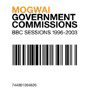 Although any self-respecting, card-carrying Mogwai fan most likely already had access to these songs, Matador presents a collection of BBC sessions which document the trajectory of the band. Presented are some alternate studio versions of classic and perhaps not-so-classic Mogwai songs recorded at the BBC's Maida Vale studios (except for "R U Still in 2 It" and "Superheroes of BMX" which were, alternately, recorded at the Hippodrome). Without the benefit or detraction (it depends on your perspective) of meticulous post-recording tinkering and mixing, the songs sound a little less polished than a proper studio album but still rather robust, proving that the beast Mogwai is unable to be laid low by something as trivial as a live, synchronized recording session. Matador bills this release as "a virtual Mogwai greatest-hits-without-actually-being-one." Once past the obvious vacuousness of that statement, at least two things become clear: one is that greatest hits compilations are almost always culled from the original studio versions of the songs (I don't think that Matador's modified vision of this album as a "virtual" greatest hits collection was based on the fact that these songs were alternate versions); two is that while these songs are a representative array of Mogwai's career (from such early releases as the third seven-inch to as recent as the latest album), they are not indicative of the best material Mogwai has released. There are too many older omissions and perhaps too equal a concentration of recent songs. In fact, the selection of songs here is rather inscrutable without being unpleasant or disappointing. The album begins with a kind tribute to the fallen John Peel (he introduces the band to the listening audience) who championed the band from their beginnings. Peel's intro leads into "Hunted by a Freak" from Happy Songs for Happy People, indicating that this collection is not in the typical chronology from earliest to most recent recordings (nor is it from most recent to earliest). Though the drums are a little more tinny here, "Hunted" sounds very similar to the original version including the ghostly effects-processed vocals. "Cody" is the first song which has a truly different feel from its original counterpart. This version is milky, lustrous, and shockingly warm, providing a nice balance to the more chilly and precise version from Come On Die Young. The original version separates the drum track in one stereo channel and everything else in the other, while this version mixes everything together without the post-production aesthetics. The warmth lies in this amalgam. The ambient "Superheroes of BMX" from the 4 Satin EP is a strange choice for inclusion because of its drifting and soporific nature (I always thought the song was largely aided by the prenominate post-recording tinkering) but it works surprisingly well and seemingly did not put the studio engineer to sleep. Young Team's eminent "Like Herod" has an expanded eighteen-minute treatment here, but I would just as soon throw it away and listen to the original version which is sufficiently brutal (in the good way) and mesmerizing. As it is on the Ten Rapid collection, the gem here is "New Paths to Helicon Pt I": this song breathes its own life and, as it inflates and eventually explodes, my attention is rapt. Background and foreground compress into one dimension and my head feels a little smaller but just big enough to contain the cosmic reality of listening to nine muses dancing and frolicking down a cypress-covered mountainside in Greece. - Joshua David Mann
Although any self-respecting, card-carrying Mogwai fan most likely already had access to these songs, Matador presents a collection of BBC sessions which document the trajectory of the band. Presented are some alternate studio versions of classic and perhaps not-so-classic Mogwai songs recorded at the BBC's Maida Vale studios (except for "R U Still in 2 It" and "Superheroes of BMX" which were, alternately, recorded at the Hippodrome). Without the benefit or detraction (it depends on your perspective) of meticulous post-recording tinkering and mixing, the songs sound a little less polished than a proper studio album but still rather robust, proving that the beast Mogwai is unable to be laid low by something as trivial as a live, synchronized recording session. Matador bills this release as "a virtual Mogwai greatest-hits-without-actually-being-one." Once past the obvious vacuousness of that statement, at least two things become clear: one is that greatest hits compilations are almost always culled from the original studio versions of the songs (I don't think that Matador's modified vision of this album as a "virtual" greatest hits collection was based on the fact that these songs were alternate versions); two is that while these songs are a representative array of Mogwai's career (from such early releases as the third seven-inch to as recent as the latest album), they are not indicative of the best material Mogwai has released. There are too many older omissions and perhaps too equal a concentration of recent songs. In fact, the selection of songs here is rather inscrutable without being unpleasant or disappointing. The album begins with a kind tribute to the fallen John Peel (he introduces the band to the listening audience) who championed the band from their beginnings. Peel's intro leads into "Hunted by a Freak" from Happy Songs for Happy People, indicating that this collection is not in the typical chronology from earliest to most recent recordings (nor is it from most recent to earliest). Though the drums are a little more tinny here, "Hunted" sounds very similar to the original version including the ghostly effects-processed vocals. "Cody" is the first song which has a truly different feel from its original counterpart. This version is milky, lustrous, and shockingly warm, providing a nice balance to the more chilly and precise version from Come On Die Young. The original version separates the drum track in one stereo channel and everything else in the other, while this version mixes everything together without the post-production aesthetics. The warmth lies in this amalgam. The ambient "Superheroes of BMX" from the 4 Satin EP is a strange choice for inclusion because of its drifting and soporific nature (I always thought the song was largely aided by the prenominate post-recording tinkering) but it works surprisingly well and seemingly did not put the studio engineer to sleep. Young Team's eminent "Like Herod" has an expanded eighteen-minute treatment here, but I would just as soon throw it away and listen to the original version which is sufficiently brutal (in the good way) and mesmerizing. As it is on the Ten Rapid collection, the gem here is "New Paths to Helicon Pt I": this song breathes its own life and, as it inflates and eventually explodes, my attention is rapt. Background and foreground compress into one dimension and my head feels a little smaller but just big enough to contain the cosmic reality of listening to nine muses dancing and frolicking down a cypress-covered mountainside in Greece. - Joshua David Mann
samples:
BOY IN STATIC, "NEWBORN"
Alien Transistor
 Towards the end of last year, Boston-area singer/songwriter and multi-instrumentalist Alex Chen released his impressive debut disc, Newborn, under the guise of Boy In Static. An interesting note on this disc is that Germany's Notwist had decided to release it on their fairly new Alien Transistor label, essentially getting Boy in Static in on its ground floor. From strummed and plucked guitar progressions and voice, Chen magnifies the depth of his songs by saddling them up with laptop-inspired clicks and wave/signal manipulation, bass, cello and tasteful keyboard melodies, blurring the lines between pop and electronic-based music. Most notable in this assembly are his breathy vocals, delicate and ethereal, at times reminiscent of the late Jeff Buckley's quieter moments in performance. With heartfelt lyrics based on cornerstones such as time, hope, friendship and love, Chen touches upon moments and senses that we can all easily identify with. "Bellyfull" [sic] lifts the lid off the disc for beautifully melodic and poetic lyrics such as "An age of silence, dribble on chin / The fate of the universe, a bellyfull end" to permeate throughout the seemingly complex arrangement of acoustic guitar and drawn out progressions from what sounds to be a harmonium. This particular instrument appears again amidst the heavier strumming of "Stay Awake" to carry a simple yet pleasant counter-melody that weaves against the vocal line and occasionally leads the tune's progression. The rockin' "Epilogue" gives the disc a swift kick in the arse with driving, snappy Jungle-inspired beats and fuzzy low end from guests Craig Mod and Matt Rào on drums and bass respectively, while the Boy bangs out the dirty tones and ringing power chords on the electric guitar while inquiring with "I hope they're satisfied." Having expanded this project with a full band, as seen a couple of weeks back on The Eye, Chen's Boy In Static, though a complex concept on paper, appears to have been easily adapted for live performance. Perhaps the Notwist or one of their member's other projects would consider taking Chen and company on the road so that those of us outside of the Boston area can experience Boy In Static first-hand. - Gord Fynes
Towards the end of last year, Boston-area singer/songwriter and multi-instrumentalist Alex Chen released his impressive debut disc, Newborn, under the guise of Boy In Static. An interesting note on this disc is that Germany's Notwist had decided to release it on their fairly new Alien Transistor label, essentially getting Boy in Static in on its ground floor. From strummed and plucked guitar progressions and voice, Chen magnifies the depth of his songs by saddling them up with laptop-inspired clicks and wave/signal manipulation, bass, cello and tasteful keyboard melodies, blurring the lines between pop and electronic-based music. Most notable in this assembly are his breathy vocals, delicate and ethereal, at times reminiscent of the late Jeff Buckley's quieter moments in performance. With heartfelt lyrics based on cornerstones such as time, hope, friendship and love, Chen touches upon moments and senses that we can all easily identify with. "Bellyfull" [sic] lifts the lid off the disc for beautifully melodic and poetic lyrics such as "An age of silence, dribble on chin / The fate of the universe, a bellyfull end" to permeate throughout the seemingly complex arrangement of acoustic guitar and drawn out progressions from what sounds to be a harmonium. This particular instrument appears again amidst the heavier strumming of "Stay Awake" to carry a simple yet pleasant counter-melody that weaves against the vocal line and occasionally leads the tune's progression. The rockin' "Epilogue" gives the disc a swift kick in the arse with driving, snappy Jungle-inspired beats and fuzzy low end from guests Craig Mod and Matt Rào on drums and bass respectively, while the Boy bangs out the dirty tones and ringing power chords on the electric guitar while inquiring with "I hope they're satisfied." Having expanded this project with a full band, as seen a couple of weeks back on The Eye, Chen's Boy In Static, though a complex concept on paper, appears to have been easily adapted for live performance. Perhaps the Notwist or one of their member's other projects would consider taking Chen and company on the road so that those of us outside of the Boston area can experience Boy In Static first-hand. - Gord Fynes
samples:
NAGISA NI TE, "DREAM SOUNDS"
Jagjaguwar
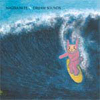 This odd release follows closely on the heels of Nagisa Ni Te's recent album The Same as a Flower. It's odd because it's a 40-minute album containing only four tracks, all of which are re-recorded versions of songs from their back catalog. It's hard to work out just what motivated Shinji Shibayama and Masako Takeda to record this brief album, other than a desire to liberate these songs from their previously relatively minimal instrumental palette and their low-fidelity recording style. It's no secret that Nagisa Ni Te have been inching ever closer to 1970s psych-rock territory over the course of their last three albums, and this album reflects this slow transition. At various times, the tracks on Dream Sounds evoke the Laurel Canyon sound, Neil Young and Pink Floyd: dreamy pop songs given a crisp rock sheen, with resounding electric guitar solos, multitracked choral backing and loads of spacious, canyonesque echo. In the midst of all this production sheen, however, the voices of Shinji and his artistic muse Masako arrive untouched, with all their rough imperfections and flat intonations intact. Though the music clearly wears its Western rock influences on its sleeve, it's still peculiarly Japanese, not least because the lyrics are sung in Nagisa Ni Te's native tongue. The lyric translations provided in the sleeve notes by Japanophile Alan Cummings are almost extraneous, as one could easily guess that the lyrics are full of light, breezy imagery about nature and romantic love. Three of the tracks are from the 1998 Japan-only release True World, with the track "The True Sun" extended into an epic, sidelong exercise in folk-rock dynamics. Shinji mounts this final track as a sequel to Neil Young's "Cortez the Killer," stretching out its length with grandiloquent guitar soloing and soaring melodies on Fender Rhodes piano and various synthesizers, interrupted by quiet acoustic passages. Five albums deep into their career, the only complaint that could be leveled against Nagisa Ni Te is the deja vu familiarity of many of their songs from album to album, which tend to sound more alike than different. This tendency is emphasized on this album, which puts together several songs with similar sounding vocal melodies. Since the majority of Western listeners won't understand the lyrics anyway, this places an emphasis on Nagisa Ni Te's arrangements, which do vary quite a bit and provide much of the richness and nuance of the album. Even at their most rock n' roll, as on the track "Anxiety," there is still a light, insubstantial feel to a lot of this music which may ultimately prove the be the band's undoing. The illustration of a cute pink Teletubby riding a wave on the album's cover doesn't help the problem, but with a track as epic and magnificent as "The True Sun," Nagisa Ni Te prove that they still have quite a few pleasures in store. - Jonathan Dean
This odd release follows closely on the heels of Nagisa Ni Te's recent album The Same as a Flower. It's odd because it's a 40-minute album containing only four tracks, all of which are re-recorded versions of songs from their back catalog. It's hard to work out just what motivated Shinji Shibayama and Masako Takeda to record this brief album, other than a desire to liberate these songs from their previously relatively minimal instrumental palette and their low-fidelity recording style. It's no secret that Nagisa Ni Te have been inching ever closer to 1970s psych-rock territory over the course of their last three albums, and this album reflects this slow transition. At various times, the tracks on Dream Sounds evoke the Laurel Canyon sound, Neil Young and Pink Floyd: dreamy pop songs given a crisp rock sheen, with resounding electric guitar solos, multitracked choral backing and loads of spacious, canyonesque echo. In the midst of all this production sheen, however, the voices of Shinji and his artistic muse Masako arrive untouched, with all their rough imperfections and flat intonations intact. Though the music clearly wears its Western rock influences on its sleeve, it's still peculiarly Japanese, not least because the lyrics are sung in Nagisa Ni Te's native tongue. The lyric translations provided in the sleeve notes by Japanophile Alan Cummings are almost extraneous, as one could easily guess that the lyrics are full of light, breezy imagery about nature and romantic love. Three of the tracks are from the 1998 Japan-only release True World, with the track "The True Sun" extended into an epic, sidelong exercise in folk-rock dynamics. Shinji mounts this final track as a sequel to Neil Young's "Cortez the Killer," stretching out its length with grandiloquent guitar soloing and soaring melodies on Fender Rhodes piano and various synthesizers, interrupted by quiet acoustic passages. Five albums deep into their career, the only complaint that could be leveled against Nagisa Ni Te is the deja vu familiarity of many of their songs from album to album, which tend to sound more alike than different. This tendency is emphasized on this album, which puts together several songs with similar sounding vocal melodies. Since the majority of Western listeners won't understand the lyrics anyway, this places an emphasis on Nagisa Ni Te's arrangements, which do vary quite a bit and provide much of the richness and nuance of the album. Even at their most rock n' roll, as on the track "Anxiety," there is still a light, insubstantial feel to a lot of this music which may ultimately prove the be the band's undoing. The illustration of a cute pink Teletubby riding a wave on the album's cover doesn't help the problem, but with a track as epic and magnificent as "The True Sun," Nagisa Ni Te prove that they still have quite a few pleasures in store. - Jonathan Dean
samples:
Loren Mazzacane Connors/Christina Carter, "Meditations on the Ascension of Blind Joe Death Vol. One"
Ecstatic Yod
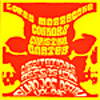 John Fahey was a master musician, completely redefining the guitar and pioneering several styles that are distinctly and wholly his own. Blind Joe Death was a name he ascribed to a few tracks on his first album of the same name. John Fahey is Blind Joe Death and, as the sleeve of this record suggests, Blind Joe is still very much alive. Loren Mazzacane Connors and Christina Carter (along with artist Conrad Capistran and Byron Coley) have composed the first in a proposed series of duo recordings dedicated to the memory and work of John Fahey. The artwork is absolutely gorgeous, imitating the style of many of Fahey's record covers down to the small essays sometimes included on the back of his sleeves. The music, however, does not recall the material on Fahey's Blind Joe Death records. Instead, Connors and Carter have opted to stick their guns and record the music as they know best. This undoubtedly works to their advantage as any attempt at copying Fahey's style on these records would be both redundant and futile. The record is broken into two side-long pieces, each of which is broken into several parts. The first side, entitled "Smoke," includes piano and a guitar whose tone is white, but distorted by some blanket, as though I'm only catching echoes of the actual performance. The movement of both instruments is slow, cold, and somber, invoking Fahey's ghost in a series of drawn out tones and shadowy folds. The guitar playing, at times, is reminiscent of Fahey's latter work, but remains far less complex and more focused on atmospheric effect. Haunting in its slow creep, the seven-part track slowly fades away and leaves a feeling of complete emptiness and absence; Fahey is obviously missed. The second side is entitled "Mirrors" and is broken into five pieces. The guitar and piano on this side move with a certain grace that reminds me entirely of Fahey without being an actual copy of his work. The mood is still solemn in some ways, but the instruments have more life in them and each note somehow vibrates and harmonizes with Fahey's attitude and approach towards music. The album ends with a sample of a recording from what might be an old 78 playing in the background. It simultaneously makes reference to Fahey's love for the history of blues and folk music and to Death himself, still responsible but unknown for so much great music. - Lucas Schleicher
John Fahey was a master musician, completely redefining the guitar and pioneering several styles that are distinctly and wholly his own. Blind Joe Death was a name he ascribed to a few tracks on his first album of the same name. John Fahey is Blind Joe Death and, as the sleeve of this record suggests, Blind Joe is still very much alive. Loren Mazzacane Connors and Christina Carter (along with artist Conrad Capistran and Byron Coley) have composed the first in a proposed series of duo recordings dedicated to the memory and work of John Fahey. The artwork is absolutely gorgeous, imitating the style of many of Fahey's record covers down to the small essays sometimes included on the back of his sleeves. The music, however, does not recall the material on Fahey's Blind Joe Death records. Instead, Connors and Carter have opted to stick their guns and record the music as they know best. This undoubtedly works to their advantage as any attempt at copying Fahey's style on these records would be both redundant and futile. The record is broken into two side-long pieces, each of which is broken into several parts. The first side, entitled "Smoke," includes piano and a guitar whose tone is white, but distorted by some blanket, as though I'm only catching echoes of the actual performance. The movement of both instruments is slow, cold, and somber, invoking Fahey's ghost in a series of drawn out tones and shadowy folds. The guitar playing, at times, is reminiscent of Fahey's latter work, but remains far less complex and more focused on atmospheric effect. Haunting in its slow creep, the seven-part track slowly fades away and leaves a feeling of complete emptiness and absence; Fahey is obviously missed. The second side is entitled "Mirrors" and is broken into five pieces. The guitar and piano on this side move with a certain grace that reminds me entirely of Fahey without being an actual copy of his work. The mood is still solemn in some ways, but the instruments have more life in them and each note somehow vibrates and harmonizes with Fahey's attitude and approach towards music. The album ends with a sample of a recording from what might be an old 78 playing in the background. It simultaneously makes reference to Fahey's love for the history of blues and folk music and to Death himself, still responsible but unknown for so much great music. - Lucas Schleicher
samples: - CD-Rs would make possible the creation of sound samples from this record.
Mouthus, "Loam"
Ecstatic Peace
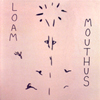 Psychedelic music has been getting a lot of attention lately, but I'm hard pressed to find anything with such a tag to be truly psychedelic. The first side of this LP from the duo of Brian Sullivan and Nate Nelson was refreshing for that reason. A vaguely rhythmic series of choppy and sloppy hi-hat smacks and tom pops lays out the framework for vibrating guitar noise and deeply running bass hums throughout the first side of Loam. It's messy, beautiful, and recalls all the effects and variables of a psychedelic painting or a hyper-real physical experience. The instruments swim in and out of each other while a clattering of sheet metal provide a point of reference or a singularity through which all the random sounds can be filtered and processed. "Yota" and "Sheep Dust" together and together they sound like one fantastic side-long epic of feedback and blossoming pseudo-melodies. The second side, however, fails to provide anything too interesting. More solid and complete rhythms come from this duo on the last three tracks and their guitar work ruins the moody and elemental nature that they introduced on the first half of the record. It's difficult even saying this because the first two tracks have been spinning for about eight rotations now and I can't bring myself to stop the constant onslaught of the keyboard-like melodies and the ear-splitting bursts of static, whines, and hellish winds. "Must Anubis" and "Throat" both have their moments, but less vibrant and seemingly less thought out ideas manifest on them. If only these songs hadn't been released on this record; they don't even sound like they belong on the same album as "Yota" and "Sheep Dust." Those two songs have me absolutely spellbound and stand out as two of my favorite songs I've heard this year. - Lucas Schleicher
Psychedelic music has been getting a lot of attention lately, but I'm hard pressed to find anything with such a tag to be truly psychedelic. The first side of this LP from the duo of Brian Sullivan and Nate Nelson was refreshing for that reason. A vaguely rhythmic series of choppy and sloppy hi-hat smacks and tom pops lays out the framework for vibrating guitar noise and deeply running bass hums throughout the first side of Loam. It's messy, beautiful, and recalls all the effects and variables of a psychedelic painting or a hyper-real physical experience. The instruments swim in and out of each other while a clattering of sheet metal provide a point of reference or a singularity through which all the random sounds can be filtered and processed. "Yota" and "Sheep Dust" together and together they sound like one fantastic side-long epic of feedback and blossoming pseudo-melodies. The second side, however, fails to provide anything too interesting. More solid and complete rhythms come from this duo on the last three tracks and their guitar work ruins the moody and elemental nature that they introduced on the first half of the record. It's difficult even saying this because the first two tracks have been spinning for about eight rotations now and I can't bring myself to stop the constant onslaught of the keyboard-like melodies and the ear-splitting bursts of static, whines, and hellish winds. "Must Anubis" and "Throat" both have their moments, but less vibrant and seemingly less thought out ideas manifest on them. If only these songs hadn't been released on this record; they don't even sound like they belong on the same album as "Yota" and "Sheep Dust." Those two songs have me absolutely spellbound and stand out as two of my favorite songs I've heard this year. - Lucas Schleicher
samples:
- Labels, please send CD-Rs with your LP releases or just send a CD-R. We love samples.
TARWATER, "THE NEEDLE WAS TRAVELING"
Morr Music
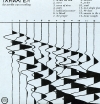 I have to admit that I'd previously never been a huge fan of Tarwater, despite their being an integral part of the German electro/pop scene with a direct connection to one of my favorite groups in the last five or so years: To Rococo Rot. For some reason, the bits and pieces I had heard over the span of a few of their discs just did not appeal to me, although all the key "cool" elements were there: slick, programmed minimalist grooves augmented with drum kit; simple and punchy bass lines occasionally performed on the upright; lush layers of synthesizers drawing out interesting chord progressions. With their recent move to the Morr label, I can now say that I've quickly fallen for them thanks in part to the subsequent release of their brilliant The Needle Was Traveling disc. All the same elements as before are present, only now with a clearly defined direction, clever hooks, swifter tempos and catchy guitar riffs figuring in more heavily on their tunes. The duo of Bernd Jestram and Ronald Lippok spent the better part of a year working out a pile of compositions; the thirteen originals on this disc having a definitive pop song structure in comparison to older material. Throughout the disc, various guests (some of whom had just happened by Jestram's studio during recording) turn up on a bevy of instruments including violin, cello, guitar and (of course) the trombone to tastefully augment the already voluptuous tracks. Lippok's deadpan, near-spoken word vocal performances, although a juxtaposition in comparison to the instrumentation, are well-supported by the backing tracks and are perfectly blended into the mix. Perhaps it was the move to the Morr label that raised the bar for Tarwater to yield such a strong collection of tunes and become more song-oriented rather than just turning out musical beats. For the disc's token cover song, the timing couldn't have been any better in choosing Minimal Compact's "Babylonian Tower." With a heavier guitar/bass combo and lower-key treatment, Tarwater have cleverly transformed it into an ominous musical metaphor for the U.S. superpower's encroachment of the Middle East. Although there's no measuring when musicians and bands have "paid their dues", Tarwater are poised for a well-deserved break out of their micro electro/dance club scene to take it to the world stage. Can I get an Amen? - Gord Fynes
I have to admit that I'd previously never been a huge fan of Tarwater, despite their being an integral part of the German electro/pop scene with a direct connection to one of my favorite groups in the last five or so years: To Rococo Rot. For some reason, the bits and pieces I had heard over the span of a few of their discs just did not appeal to me, although all the key "cool" elements were there: slick, programmed minimalist grooves augmented with drum kit; simple and punchy bass lines occasionally performed on the upright; lush layers of synthesizers drawing out interesting chord progressions. With their recent move to the Morr label, I can now say that I've quickly fallen for them thanks in part to the subsequent release of their brilliant The Needle Was Traveling disc. All the same elements as before are present, only now with a clearly defined direction, clever hooks, swifter tempos and catchy guitar riffs figuring in more heavily on their tunes. The duo of Bernd Jestram and Ronald Lippok spent the better part of a year working out a pile of compositions; the thirteen originals on this disc having a definitive pop song structure in comparison to older material. Throughout the disc, various guests (some of whom had just happened by Jestram's studio during recording) turn up on a bevy of instruments including violin, cello, guitar and (of course) the trombone to tastefully augment the already voluptuous tracks. Lippok's deadpan, near-spoken word vocal performances, although a juxtaposition in comparison to the instrumentation, are well-supported by the backing tracks and are perfectly blended into the mix. Perhaps it was the move to the Morr label that raised the bar for Tarwater to yield such a strong collection of tunes and become more song-oriented rather than just turning out musical beats. For the disc's token cover song, the timing couldn't have been any better in choosing Minimal Compact's "Babylonian Tower." With a heavier guitar/bass combo and lower-key treatment, Tarwater have cleverly transformed it into an ominous musical metaphor for the U.S. superpower's encroachment of the Middle East. Although there's no measuring when musicians and bands have "paid their dues", Tarwater are poised for a well-deserved break out of their micro electro/dance club scene to take it to the world stage. Can I get an Amen? - Gord Fynes
samples:
Severed Heads, "Rotund For Success"
LTM
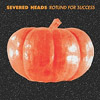 The fifth full length from Australia's own Severed Heads lies somewhat comfortably on the timeline of the project's natural progression from dark industrial (Dead Eyes Opened 83) towards more accessible dance (Dead Eyes Opened 94). Released in 1989 on the Nettwerk and Volition labels, the album spawned a trio of dancefloor designed singles that by themselves warrant this reissue by the highly regarded LTM Publishing imprint, known for giving similar treatment to albums from Section 25 and 23 Skidoo. The disc begins with one of those singles, the Robert Racic produced album mix of "All Saints Day." Over an infectious bassline that is as much EBM as it is acid house, Heads' mastermind Tom Ellard sings airily and hopefully while keyboard flourishes and echoed handclaps run amok. The second track, "Triangle Tangle Tango," warps and warbles in a stew of playful cacophony held together by a steady beat and a few key melodic elements. "Greater Reward," the album's first single, brings to mind some of New Order's like-minded material from that same period, particularly on the chorus and in the track's outro. "Big Car" follows afterwards and continues along that same logical route of new wave-inspired grooves with squirmy panning synths, distant sampled voices, and Ellard's repeated "shine a light on me" vocal hook. While still catchy thanks to Ellard's voice, the title track's lamentful bells and ominous atmospheres manage to give off a quasi-gothic feel not found elsewhere on the album. Middle-Eastern chants and oppressive bassy drones set the tone for the beatless "Chasing Skirt," the final song from the original album, leaving a gloomy aftertaste to this largely bright album. The five bonus cuts that accompany this reissue include the original version of "All Saints Day" and the non-album instrumentals "Star Spangled Bradbury" and "Bombs Fell." The booklet features an impressive abridged version of Bernie Maier's biography of the band, found in its entirety on the LTM website. Those who recall Severed Heads' far more experimental albums like Since The Accident and City Slab Horror (the latter recently self-reissued by Ellard) might very well be turned off to something that is so decidedly reaching for more mainstream success. Nonetheless, music lovers not limited solely to difficult listening and elitist esoterica will find Rotund For Success both a worthwhile treasure and, on another level, an upbeat throwback to a time where electronic dance music was still going through growing pains. - Gary Suarez
The fifth full length from Australia's own Severed Heads lies somewhat comfortably on the timeline of the project's natural progression from dark industrial (Dead Eyes Opened 83) towards more accessible dance (Dead Eyes Opened 94). Released in 1989 on the Nettwerk and Volition labels, the album spawned a trio of dancefloor designed singles that by themselves warrant this reissue by the highly regarded LTM Publishing imprint, known for giving similar treatment to albums from Section 25 and 23 Skidoo. The disc begins with one of those singles, the Robert Racic produced album mix of "All Saints Day." Over an infectious bassline that is as much EBM as it is acid house, Heads' mastermind Tom Ellard sings airily and hopefully while keyboard flourishes and echoed handclaps run amok. The second track, "Triangle Tangle Tango," warps and warbles in a stew of playful cacophony held together by a steady beat and a few key melodic elements. "Greater Reward," the album's first single, brings to mind some of New Order's like-minded material from that same period, particularly on the chorus and in the track's outro. "Big Car" follows afterwards and continues along that same logical route of new wave-inspired grooves with squirmy panning synths, distant sampled voices, and Ellard's repeated "shine a light on me" vocal hook. While still catchy thanks to Ellard's voice, the title track's lamentful bells and ominous atmospheres manage to give off a quasi-gothic feel not found elsewhere on the album. Middle-Eastern chants and oppressive bassy drones set the tone for the beatless "Chasing Skirt," the final song from the original album, leaving a gloomy aftertaste to this largely bright album. The five bonus cuts that accompany this reissue include the original version of "All Saints Day" and the non-album instrumentals "Star Spangled Bradbury" and "Bombs Fell." The booklet features an impressive abridged version of Bernie Maier's biography of the band, found in its entirety on the LTM website. Those who recall Severed Heads' far more experimental albums like Since The Accident and City Slab Horror (the latter recently self-reissued by Ellard) might very well be turned off to something that is so decidedly reaching for more mainstream success. Nonetheless, music lovers not limited solely to difficult listening and elitist esoterica will find Rotund For Success both a worthwhile treasure and, on another level, an upbeat throwback to a time where electronic dance music was still going through growing pains. - Gary Suarez
samples:
Asmus Tietchens, "Litia"
Die Stadt
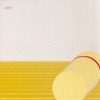 This marks the fifth in Die Stadt's ongoing Tietchens reissue campaign and the last of the artist's early works to be released initially by Sky Records. The sound is similar to the previous Sky discs and closest to the best of the five, Biotop and Spät Europa. Tietchens is again working within the pop format to produce warped, retro-futurist jingles from an intimidating collection of antique synthesizers, but here, as on Spät and its successor In Die Nacht, he toys more and more with the a-melodic fragments and jagged, sinister rhythm tracks of a developing industrial personality. The mood is still all fun, but for the first time Tietchens seems involved in creating a mystery, allowing the pop context to assert itself only for reasons of parody. Rhythm remains flat and static throughout, the music's tune-ful elements accomplishing little more than a program of retarded waltzes, coated in plastic echo and hideously pixilated accents. Songs are short, but feel long, drawn into a distant nocturnal sprawl, de-energized by the metallic flavor of the sounds and their explicitly mechanical construction. Though criticized for exposing a fusion of the artist's interests too uneven to be enjoyable, Litia sounds today like an odd voice of dissent, dark and harsh enough to reject the pop perspective, yet immediate beyond the visceral associations of industrial music. A punk sensibility enters, encouraged by Tietchens' reliable deadpan presentation, lending the album some of its predecessors' light-heartedness without a sacrifice in the cold exactitude of the music. New comparisons might include the more lo-fi work of Flux Information Sciences whose own brand of cut-up, industrialized pop reaches a similar apex of plasticity, self-parody, and gritty self-indulgence. And while the music simply does not achieve the same addictive quality of Biotop or Spät, the Litia reissue attaches more bonus material than any before it, including Rattenheu, a 10" from the same sessions. Without the stifling rhythmic linearity of album tracks, these become some of highlights of the reissue, sounding much less dated (not surprising, as the 10" was released in 1996, years after the 1983 recording), similar to the looser pop-oriented late 90s work Tietchens did with the Hematic Sunsets and the Scorpions. - Andrew Culler
This marks the fifth in Die Stadt's ongoing Tietchens reissue campaign and the last of the artist's early works to be released initially by Sky Records. The sound is similar to the previous Sky discs and closest to the best of the five, Biotop and Spät Europa. Tietchens is again working within the pop format to produce warped, retro-futurist jingles from an intimidating collection of antique synthesizers, but here, as on Spät and its successor In Die Nacht, he toys more and more with the a-melodic fragments and jagged, sinister rhythm tracks of a developing industrial personality. The mood is still all fun, but for the first time Tietchens seems involved in creating a mystery, allowing the pop context to assert itself only for reasons of parody. Rhythm remains flat and static throughout, the music's tune-ful elements accomplishing little more than a program of retarded waltzes, coated in plastic echo and hideously pixilated accents. Songs are short, but feel long, drawn into a distant nocturnal sprawl, de-energized by the metallic flavor of the sounds and their explicitly mechanical construction. Though criticized for exposing a fusion of the artist's interests too uneven to be enjoyable, Litia sounds today like an odd voice of dissent, dark and harsh enough to reject the pop perspective, yet immediate beyond the visceral associations of industrial music. A punk sensibility enters, encouraged by Tietchens' reliable deadpan presentation, lending the album some of its predecessors' light-heartedness without a sacrifice in the cold exactitude of the music. New comparisons might include the more lo-fi work of Flux Information Sciences whose own brand of cut-up, industrialized pop reaches a similar apex of plasticity, self-parody, and gritty self-indulgence. And while the music simply does not achieve the same addictive quality of Biotop or Spät, the Litia reissue attaches more bonus material than any before it, including Rattenheu, a 10" from the same sessions. Without the stifling rhythmic linearity of album tracks, these become some of highlights of the reissue, sounding much less dated (not surprising, as the 10" was released in 1996, years after the 1983 recording), similar to the looser pop-oriented late 90s work Tietchens did with the Hematic Sunsets and the Scorpions. - Andrew Culler
samples:
BARDO POND, "CYPHER DOCUMENTS I"
Three Lobed
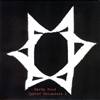 This is the first in a projected series collecting studio material that appeared on singles, compilations and other formats. This first volume compiles seven tracks that were originally available briefly as free MP3 downloads from Bardo Pond's website. The seventh and final track was originally available only as an excerpt, and is here presented in its full, epic 31-minute length. All of these tracks were recorded around the time of 1999's Set and Setting album, and thus reflect the band's sound during that time. The Bardo Pond sound has not changed all that much over the course of their prolific career: a heavy, atonal rock sound characterized by mountains of hypnotic feedback, reverb and drone. Typical of bands comprised largely of non-musicians, they focus more on the textural quality of sound and less on melody and dynamism. Though their lyrical imagery and song titles often reference psychedelics, their sound is much closer to Sonic Youth or My Bloody Valentine: more artsy noise rock than space rock. One of the problems with Bardo Pond is that their live performances have always been vastly superior to their recorded output, much of which sounds stiflingly uniform. And these tracks are no exception, playing up the band's tendency towards churning rock pushed into the red zone of distortion, with singer Isobel Sollenberger providing indecipherable, vaguely bluesy vocal moaning. There are a few moments scattered across this collection where Bardo Pond goes outside of their usual repertoire, notably with the sparse, subtle ambience of "Nomad" and "Quiet Tristin," which seem to be drawn from free improvisations, providing some quietly hypnotic moments that stand out on an otherwise routine album. "YaYaYaYa" is an interestingly deconstructed funk track, which is a study in layered chaos, but doesn't really go anywhere. "Black Turban" begins with a very traditional-sounding blues-rock riff that could have been lifted from any number of Jimi Hendrix albums and repeats it ad nauseum while taking several tangential trips into aimless improvisation. "From the Sky" is the album's behemoth final track, a slow burning epic that makes the most of the interplay between dual guitars and drums, endlessly riffing as the noisy sediment compounds and buried almost-melodies bubble to the surface and fade away into the heavy, oppressive hash smoke once again. As could be expected from material that is nearly six years old, nothing here is earth shattering, and Bardo Pond continue to be in no danger of igniting any trends. Instead, they rather relentlessly pound away at their same signature sound, which is this current market of trendspotting and postmodern chameleonism, has got to be worth something. - Jonathan Dean
This is the first in a projected series collecting studio material that appeared on singles, compilations and other formats. This first volume compiles seven tracks that were originally available briefly as free MP3 downloads from Bardo Pond's website. The seventh and final track was originally available only as an excerpt, and is here presented in its full, epic 31-minute length. All of these tracks were recorded around the time of 1999's Set and Setting album, and thus reflect the band's sound during that time. The Bardo Pond sound has not changed all that much over the course of their prolific career: a heavy, atonal rock sound characterized by mountains of hypnotic feedback, reverb and drone. Typical of bands comprised largely of non-musicians, they focus more on the textural quality of sound and less on melody and dynamism. Though their lyrical imagery and song titles often reference psychedelics, their sound is much closer to Sonic Youth or My Bloody Valentine: more artsy noise rock than space rock. One of the problems with Bardo Pond is that their live performances have always been vastly superior to their recorded output, much of which sounds stiflingly uniform. And these tracks are no exception, playing up the band's tendency towards churning rock pushed into the red zone of distortion, with singer Isobel Sollenberger providing indecipherable, vaguely bluesy vocal moaning. There are a few moments scattered across this collection where Bardo Pond goes outside of their usual repertoire, notably with the sparse, subtle ambience of "Nomad" and "Quiet Tristin," which seem to be drawn from free improvisations, providing some quietly hypnotic moments that stand out on an otherwise routine album. "YaYaYaYa" is an interestingly deconstructed funk track, which is a study in layered chaos, but doesn't really go anywhere. "Black Turban" begins with a very traditional-sounding blues-rock riff that could have been lifted from any number of Jimi Hendrix albums and repeats it ad nauseum while taking several tangential trips into aimless improvisation. "From the Sky" is the album's behemoth final track, a slow burning epic that makes the most of the interplay between dual guitars and drums, endlessly riffing as the noisy sediment compounds and buried almost-melodies bubble to the surface and fade away into the heavy, oppressive hash smoke once again. As could be expected from material that is nearly six years old, nothing here is earth shattering, and Bardo Pond continue to be in no danger of igniting any trends. Instead, they rather relentlessly pound away at their same signature sound, which is this current market of trendspotting and postmodern chameleonism, has got to be worth something. - Jonathan Dean
samples:
PIANO MAGIC, "OPENCAST HEART"
Important
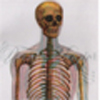 Since their formation in 1996, the only thing that has stayed the same about Piano Magic is how much they've changed. That and Glen Johnson, the only fixture of the group, which includes a revolving door lineup of musicians who come and go like breathing over the course of the project's numerous albums, EPs, soundtracks and compilations. This collaborative atmosphere has resulted in wildly inconsistent results, which may be an advantage for the group, as it keeps their cult of interested listeners in a state of constant suspense about what each new release might bring. This new EP is the band's first release for Important, and it's also their first foray into full-blown electronic laptop-pop. There's been a heavy experimental, bedroom electronics feel to past releases, but this is the first time that Glen Johnson and Co. have gone high-tech, throwing their lot in with the likes of The Notwist and Postal Service. It seems a peculiarly calculated move for a band that never previously seemed to care about musical trends, and ultimately, I'm not sure if it pays off. The opening track "Echoes on Ice" employs the vocal talents of Klima's Angele David-Guillou against a cold backdrop of sparse digital glitchery with the barest subliminal suggestions of melody and rhythm. It's all very nice, but it sounds nearly identical to the music on Bjork's Vespertine album, and doesn't share the same tantalizingly mysterious atmosphere of previous Piano Magic efforts. It seems fairly derivative, and while it will doubtless appeal to those can't get enough of this sort of thing, it sounds rather tired and dull to me. "The Journal of a Disappointed Man" is inspired by the diaries of W.N.P. Barbellion, a work of terse miserablism that informs Glen Johnson's spoken-word vocals on the track, which continues the same minimal atmospherics from the opening track. "I Didn't Get Where I Am Today" again features singing by David-Guillou, another pointless Bjorkesque wintry ode to depression and solitude. Rounding out the brief EP is "This Heart Machinery," with vocals by Johnson, this time with slightly more compelling backing electronics. Judging by the liner notes for the album, which inform me that Jerome Tcherneyan and Cedric Pin are solely responsible for the music on the album, with Johnson only providing lyrics, it seems to me that Johnson has leaned too heavily on his collaborators this time, ending up with a release that is bland, faceless and unremarkable. - Jonathan Dean
Since their formation in 1996, the only thing that has stayed the same about Piano Magic is how much they've changed. That and Glen Johnson, the only fixture of the group, which includes a revolving door lineup of musicians who come and go like breathing over the course of the project's numerous albums, EPs, soundtracks and compilations. This collaborative atmosphere has resulted in wildly inconsistent results, which may be an advantage for the group, as it keeps their cult of interested listeners in a state of constant suspense about what each new release might bring. This new EP is the band's first release for Important, and it's also their first foray into full-blown electronic laptop-pop. There's been a heavy experimental, bedroom electronics feel to past releases, but this is the first time that Glen Johnson and Co. have gone high-tech, throwing their lot in with the likes of The Notwist and Postal Service. It seems a peculiarly calculated move for a band that never previously seemed to care about musical trends, and ultimately, I'm not sure if it pays off. The opening track "Echoes on Ice" employs the vocal talents of Klima's Angele David-Guillou against a cold backdrop of sparse digital glitchery with the barest subliminal suggestions of melody and rhythm. It's all very nice, but it sounds nearly identical to the music on Bjork's Vespertine album, and doesn't share the same tantalizingly mysterious atmosphere of previous Piano Magic efforts. It seems fairly derivative, and while it will doubtless appeal to those can't get enough of this sort of thing, it sounds rather tired and dull to me. "The Journal of a Disappointed Man" is inspired by the diaries of W.N.P. Barbellion, a work of terse miserablism that informs Glen Johnson's spoken-word vocals on the track, which continues the same minimal atmospherics from the opening track. "I Didn't Get Where I Am Today" again features singing by David-Guillou, another pointless Bjorkesque wintry ode to depression and solitude. Rounding out the brief EP is "This Heart Machinery," with vocals by Johnson, this time with slightly more compelling backing electronics. Judging by the liner notes for the album, which inform me that Jerome Tcherneyan and Cedric Pin are solely responsible for the music on the album, with Johnson only providing lyrics, it seems to me that Johnson has leaned too heavily on his collaborators this time, ending up with a release that is bland, faceless and unremarkable. - Jonathan Dean
samples:
We know that our music picks may be somewhat challenging to find, which is why we have a community section which can be used to obtain nearly everything available on this site. |
|

WEEK OF MARCH 13 - MARCH 12
Aarktica/Aaron Spectre - Ocean split 12" (Moonbunny, Germany)
AFX - Analord 5 12" (Rephlex, UK)
AFX - Analord 6 12" (Rephlex, UK)
The Angels of Light - Sing "Other People" CD (Young God, US)
Auburn Lull - Regions Less Parallel: Early Works and Rarities 1996-2004 CD (Darla, US)
Backlash - Lodestar CDEP (WTII, US)
Basement Jaxx - Oh My Gosh! 12"/two CDEPs (XL Recordings/Beggars, Canada)
Basement Jaxx - Oh My Gosh! 12"/two CDEPs (XL Recordings, UK)
Carrie - Honey Blue Star CD (Static Discos, Mexico - Dearstereofan, Spain)
Nick Cave And The Bad Seeds - Get Ready For Love 7"/CDEP (Mute, UK)
Maria Chavez - t.b.a. CDR3" (Scarcelight, US)
Cyclotimia - Eschaton CD (Stateart, Germany)
The Dead C/Konono No. 1 Split Series #18 12" (FatCat, UK)
* Everything But The Girl - Adapt Or Die: Ten Years of Remixes CD (Rhino, US)
The Field - Things Keep Falling Down 12" (Kompakt, Germany)
Freeform - Outside In CD/LP (Skam, UK)
* Nick Grey & The Random Orchestra - Regal Daylight CD [reissue] (Stateart, Germany)
Markus Güntner - t.b.a. 12" (Ware, Germany)
Implant - Self-Inflicted CD [also available in a 2xCD limited edition] (Alfa-Matrix, Belgium)
JR - La JR CD (Acuarela, Spain)
Leak - Redemption CD (Stateart, Germany)
Mahogany - Memory Column: Early Works and Rarities 1996-2004 2xCD (Darla, US)
Meloboy - Hot Love 12" (novamute, UK)
Merzbow - Rattus Rattus CD (Scarcelight, US)
M.I.A. - Arular CD/LP (XL Recordings/Beggars, Canada)
Moby - Hotel CD/LP (Mute, UK)
The Mole - One Foot On Either Side Of The Ladder 12" (Mutek_Rec, Canada)
Monade - A Few Steps More CD/LP (Too Pure, UK)
Red Sparowes - At The Soundless Dawn 2xLP (Hypertension, Belgium)
* Scritti Politti - Early CD [collection of early singles] (Rough Trade America, US)
Chris Smith/The Ivytree Split Series #17 12" (FatCat, UK)
Swervedriver - Juggernaut Rides 2xCD [best-of collection] (Castle, UK)
Tangerine Dream - Brighton 1986 Live 2xCD (Bootmoon/Voiceprint, UK)
Tangerine Dream - Cleveland 1986 Live 2xCD (Bootmoon/Voiceprint, UK)
Tarwater - The Needle Was Travelling CD/2xLP (Morr Music, Germany)
13+God [Themselves & The Notwist] - Men Of Station/Soft Atlas 12" (Anticon, US)
Various - Cocteau, Satie & Les Six CD (LTM, UK)
Various - Intricate Maximals CD (Audiobulb, UK)
Various - Now 01 12" [with Funckarma, Gram, Somshit, Pytlik] (Underscan, Germany)
Various - Rough Trade Shops: Counter Culture 2004 2xCD (Mute, UK)
Various - Some Paths Lead Back Again: A Compilation By The Marcia Blaine School For Girls 2xCD (Highpoint Lowlife, UK)
Venetian Snares - Rossz Csillag Alatt Született CD/2xLP (Planet µ, UK)
Luke Vibert - Lover's Acid 12" (Planet µ, UK)
This is simply this week's highlights from the NEW RELEASES provided by Greg and Feedback Monitor. For a more detailed schedule stretching into the future, please check out the page, since release dates can and will often change.
|